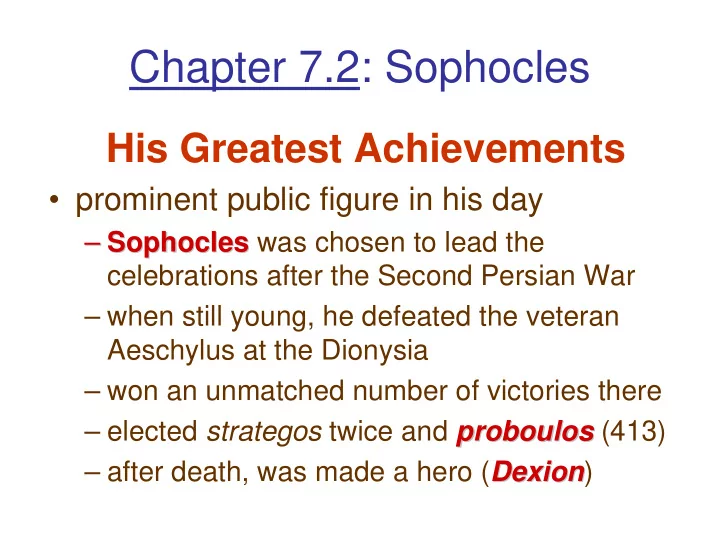

Chapter 7.2: Sophocles His Greatest Achievements • prominent public figure in his day – Sophocles Sophocles was chosen to lead the – celebrations after the Second Persian War – when still young, he defeated the veteran Aeschylus at the Dionysia – won an unmatched number of victories there – elected strategos twice and proboulos proboulos (413) – after death, was made a hero ( Dexion Dexion )
Chapter 7.2: Sophocles His Greatest Achievements • advances he introduced to theatre – focus on the “dramatic situation,” e.g. scenes where all three participants react differently – he made the chorus chorus smaller in number and more of an interpreter than a participant in the dramatic action • cf. On the Chorus On the Chorus – used simple but multi-layered language language – wrote the first known “ unconnected trilogies unconnected trilogies ”
Chapter 7.2: Sophocles His Greatest Achievements • subverted the audience’s traditional expectation of a character’s behavior morality – Deianeira Deianeira : confused, not vengeful – – Phaedra Phaedra : seeking a political, not an erotic – connection with Hippolytus – Oedipus Oedipus : ignorant and essentially innocent, – instead a power-hungry tyrant who’d do the unthinkable to keep his throne
Chapter 7.2: Sophocles His Greatest Achievements • the superiority of the audience over the characters on stage – a reflection of their—and Sophocles’— position in theatron – cf. the gods in Homer on Mount Ida – especially Zeus in Book 16 of The Iliad who weeps “tears of blood” for his son Sarpedon whom the Fates have condemned to death
Chapter 7.2: Sophocles The Seven Extant Tragedies Ajax (ca. 440 BCE) • opening scene: Athena shows Odysseus how she has beguiled Ajax • Ajax’ suicide requires a change of scene • Tecmessa’s lament
Chapter 7.2: Sophocles The Seven Extant Tragedies Antigone , ca. 441 BCE • probably Sophocles’ most produced play today • who is the central character (hero): Antigone or Creon • the double burial? • best character: the Guard, a comic figure which is a rarity in Sophocles
Chapter 7.2: Sophocles The Seven Extant Tragedies Trachiniae ( Women of Trachis ) • about the death of Heracles (Hercules) • best scene: Deianeira’s prologue (the reality of women’s lives in antiquity) • in the finale, the dying Heracles seems pointlessly long-winded and cruel
Chapter 7.2: Sophocles The Seven Extant Tragedies Oedipus ( Tyrannos ), ca. 428 BCE • Sophocles’ most famous and respected play, both in antiquity and now • but exposition is problematic – why hasn’t the truth surfaced earlier? • does Sophocles’ experiment (to reform Oedipus’ character) work? – is that why it failed to win first prize?
Chapter 7.2: Sophocles The Seven Extant Tragedies Electra (420’s BCE?) Electra • in many ways his best surviving play, to judge by its current reception today • Electra is psychologically (psychotically?) opposed to her mother • two excellent scenes: – urn scene: Electra clings to Orestes’ ashes – murder: Orestes murders Clytemnestra
Chapter 7.2: Sophocles The Seven Extant Tragedies Philoctetes (409 BCE) • written in the wake of the Sicilian Expedition and the Oligarchic Revolution • reflects a world fractured and disillusioned • major question: should Philoctetes follow his mythologically predestined fate and return to Troy, despite all his suffering? • deus ex machina : Heracles
Chapter 7.2: Sophocles The Seven Extant Tragedies Oedipus at Colonus • Sophocles’ last play, produced posthumously • how much of it is by Sophocles? • best scene: the messenger’s report of Oedipus’ apotheosis at Colonus who will subsequently bless Athens after death
Chapter 7.2: Sophocles The Lost Sophocles • very few papyri containing Sophocles – despite Aristotle and the approbation of later Roman critics and adapters, how popular was Sophocles really? • Niobe : Apollo and Artemis shoot down the children of Niobe
Recommend
More recommend